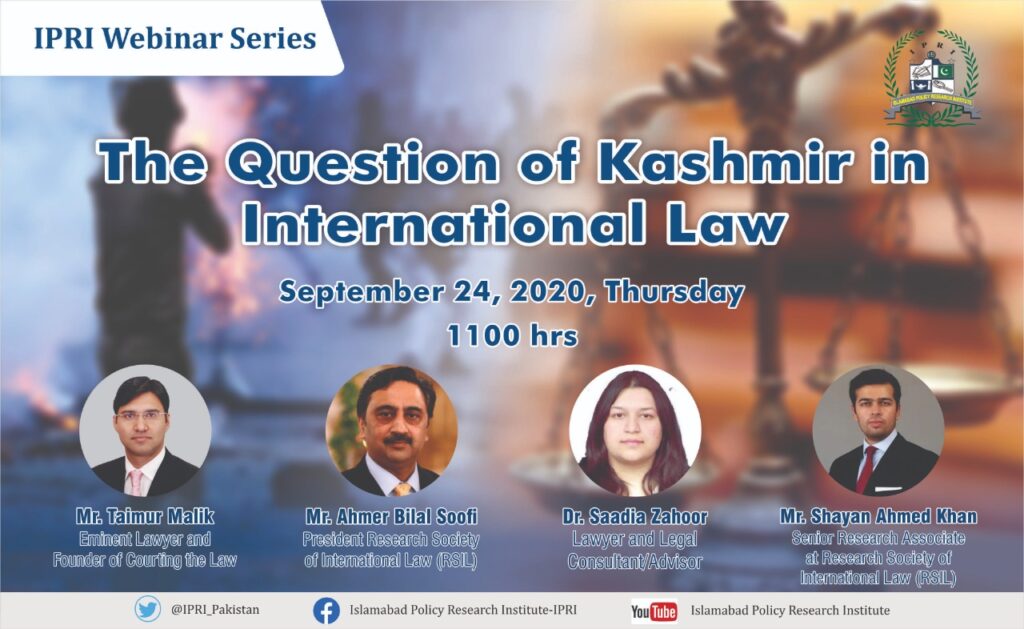Conference / Seminar / Webinar 24/09/2020

General
Islamabad Policy Research Institute (IPRI) organized a “Zoom Webinar” on the “The Question of Kashmir in International Law” on September 24, 2020. The distinguished panel, invited to deliberate and provide expert inputs on the subject, included Mr. Taimur Malik, Lawyer and ‘Founder of Courting the Law’, who spoke on the topic, “Practices in the IOJK in the Light of the Prevailing International Law: A Review of Post 5th August Scenario”. Mr. Shayan Ahmed, Senior Research Associate at Research Society of International Law (RSIL) and Centre of Excellence for International Law, National Defence University spoke on the topic, “Human Rights Violations and Legal Recourse”. Dr. Saadia Zahoor, Lawyer and Legal Consultant/Advisor was invited to speak on the topic “Kashmir and International Judicial/Legal Institutions. Brig. (R) Raashid Wali Janjua, Acting President/Director Research, IPRI set the stage by giving his welcome and concluding remarks.
Concept Note
On 5th August, 2019, ten days before its 72nd Independence, India ripped the special status of Indian Illegally Occupied Jammu and Kashmir (IIOJK) by revoking Articles 35-A and 370 of its own Constitution. Later, it amended more than 100 State laws in violation of the United Nations Charter, United Nations Security Council Resolutions, Law of Occupation, principles of International Human Rights & International Humanitarian Law, and Customary International Law.
Unfortunately, the international legal system is tangled with international power politics. It is, thus, important to untangle the two aspects to fully comprehend the legal aspects of the issue. India has certain obligations under international conventions, bi-lateral Agreements, unilateral statements as well as its Constitution and Customary Law. However, India continues to violate these obligations and is committing grave violations of international law.
Key Takeaways
In the light of views expressed by the speakers and discussion, following key takeaways are noteworthy:-
- Pakistan needs to build linkages with human rights organizations such as The Foundation of Fundamental Rights (FFR), European Convention on Human Rights (ECHR) and Trial International Redress (TIR). These organizations file petitions in ICC on behalf of victims of human rights abuses who do not have access to any evidence to bring before the courts, and facing ban to physically travel to developed countries in order to file cases against the perpetrators of human rights.
- Through effective and well-coordinated campaign, Kashmiri victims of Indian atrocities should be empowered to present their cases in international legal fora.
- Provisional representation to the people of ‘Jammu and Kashmir’ can be given in the Pakistani Parliament to sensitize the dispute for the international community.
- Pakistan needs to build up its defence against India in the field of law. The aim is to counter India in the legal domain. The ‘Ministry of Law’ must build its capacity in international law in order to take up the Kashmir case at international forums and important capitals.. The Ministry should play an active part in government proceedings on the Kashmir dispute.
- The Foreign Office’s legal division need to be strengthened and its members may be. posted to Pakistani missions abroad. This will provide Pakitani missions with legal inputs and toe enable them to be in a better position to plead Pakistan’s case legal matters of national interest. It will also be helpful in projecting the case of Kashmir on legal grounds to international audiences.
- The human rights violations in Indian occupied Jammu and Kashmir have exposed the extremist face of so-called secular India. The Ministry of Human Rights should be strengthened to carry out such tasks.
- The media needs to play a proactive role in highlighting the Indian military’s inhumane facet. Pictures, including that of a child sitting on the dead body of his grandfather are the real face of Indian security force and needs projection to domestic and international audiences.
- Pakistanis studying in foreign universities or on jobs in Western capitals need to be approached. This will provide Pakistan with grounds to disseminate information to counter Indian propaganda.
